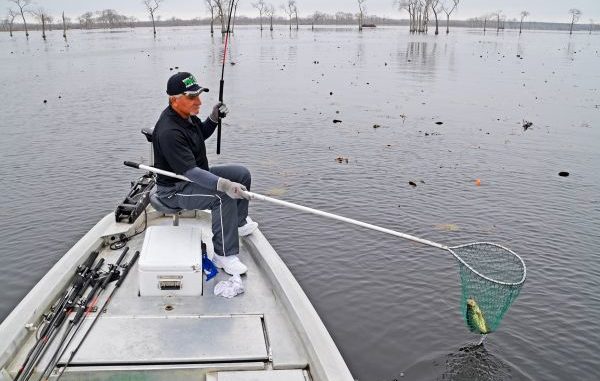
The 3,200-acre Miller’s Lake in Avoyelles Parish is unusual in that it is entirely private but open to public fishing.
Gene Bullard of Ville Platte, the secretary-treasurer of the Miller’s Lake Hunting Club, is rich with the lore of the lake.
The footprint of the present lake was once a bunch of little sloughs and bayous known in Cajun French as a “platin,” because the area was so flat, According to Bullard.
The spot was drained by Bayou Nezpique, named after the local Indian tribe that tattooed their noses.
Gus Miller, a rice farmer who was born and raised between Mamou and Ville Platte, bought about 5,000 acres in the area and drained the higher portions of his purchase into lower areas.
Then in 1927, he built levees to hold the water.
Each year, more dirt was added to the levees, and the lake became larger. In 1952, the family applied through the National Soil Conservation Act to build the present high levees.
The lake was always used for rice field irrigation, but early on Gus Miller formed the Miller’s Lake Hunting Club, the same club that exists today and the one Bullard has been a member of for 63 years.
The club has 100 members, 35 or 40 of which are family members.
The northeastern side of the lake is reserved for family members. And the lake is closed to public fishing during duck season.
According to Mike Perron, the lake caretaker, the use of trotlines, jug lines and yo-yos is prohibited to the public.
During open fishing season, Perron makes the call about what time each morning anglers can leave the dock. All boats must be off the water before sunset.
Bullard said Miller’s Lake is known for big fish. The largest crappie he knows of coming from the lake is 4 pounds. Bluegills are commonly “bigger than your hand,” and redears (aka chinquapin) will run up to 2 pounds.
He calls the lake’s bass fishing “terrific.” The lake record is a 15-pound, 3-ounce hawg.
Bullard maintains that the annual summer draining cycle that pulls the lake down to half its full size creates a drawdown effect.
“It happens every year, and as a result the lake is very fertile.”